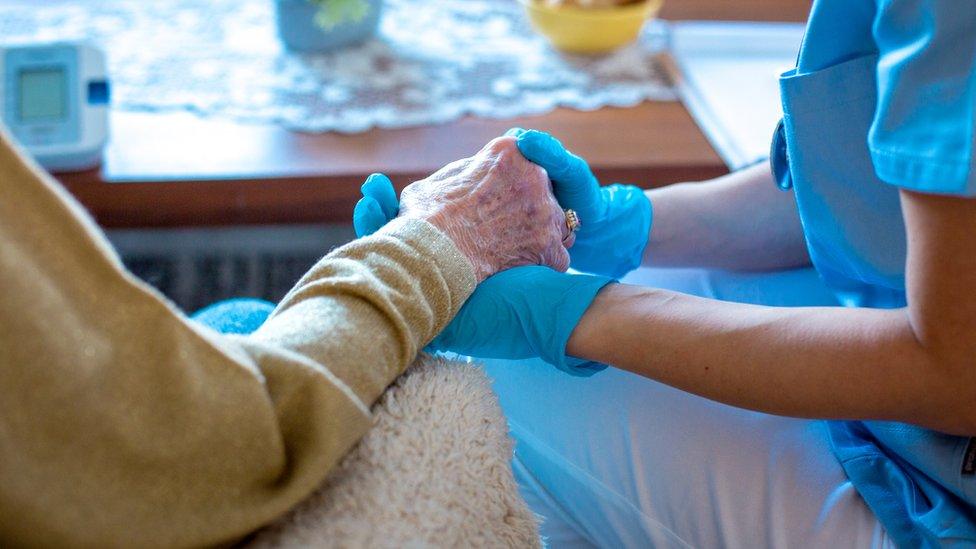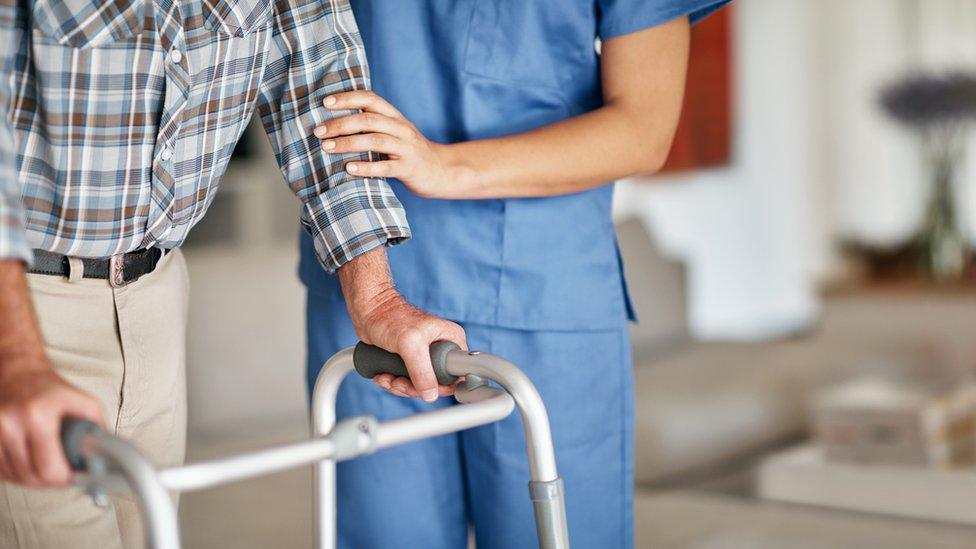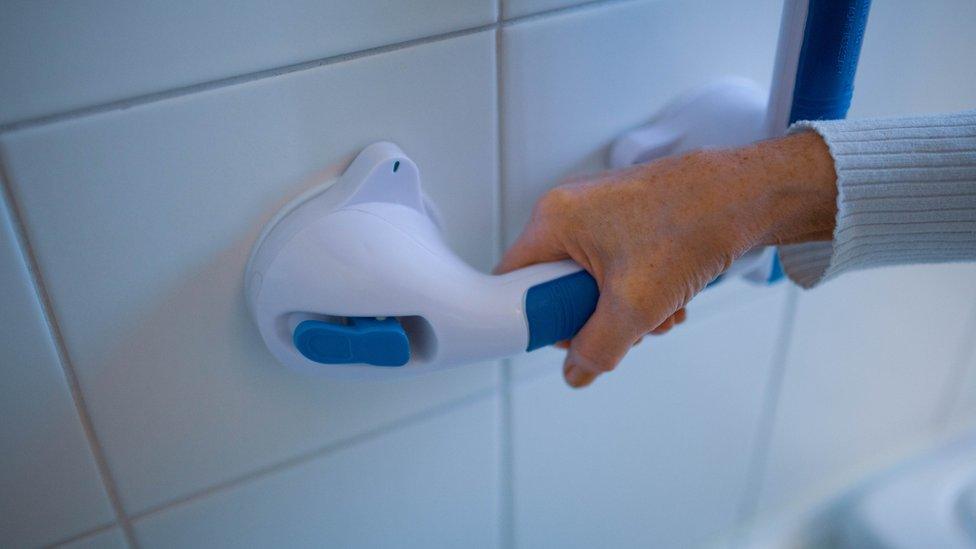Care packages: Almost 2,000 people waiting for support in own homes
- Published

Many vulnerable people need regular visits from carers in order to be able to live in their pwn homes
Almost 2,000 people in Northern Ireland are waiting for care packages, mainly so they can be supported to live in their own homes, the BBC has learned.
The highest waiting list was in the Belfast Trust area, which accounted for more than 40% of the total.
There is currently an average waiting time of 55 days. The trust has apologised to the patients affected.
There are waiting lists in every part of Northern Ireland, with the Covid-19 pandemic affecting services.
Care packages are required by elderly, disabled or vulnerable people who need help with washing, dressing or cooking, or who need adaptations to their home.
Without this assistance, some patients have to stay in residential care.
Figures obtained from the five local health trusts last week showed 1,909 people were waiting for a care package.
790 people waiting in the Belfast Health Trust
345 people waiting in the Northern Health Trust
295 people waiting in the Southern Health Trust
282 people waiting in the Southern Eastern Health Trust
197 people waiting in the Western Health Trust

'We've exhausted all avenues'
The numbers were requested after the BBC's Good Morning Ulster programme spoke to the family of an elderly man who has been told he cannot be discharged from a care home until his care package is in place.
"We've exhausted all avenues to try and get him home," his daughter, Eimear, told the programme.
"Every time you go into the home to see daddy, the first thing that he asks is: 'Is there any update on me getting home?' You feel terrible because you're not giving him an update, you're just saying 'take each day as it comes'."
The family, from the Mid Ulster area, did not want their surnames to be made public, but the BBC has checked their details with the Northern Health Trust.
Eimear explained that her father, Arthur, suffered a stroke almost five years ago, which left him with severe mobility problems.
He was eventually able return to their family home, with one carer visiting twice a day, morning and evening.
However, in May this year Arthur became very ill with arthritis and had to go back into hospital for a short period.
His care needs were reassessed, and health authorities decided he would now need four home visits per day, with two carers attending each visit.
However, because the care package was not in place, he was given a "contingency bed" in a care home while the appropriate support was arranged.
Arthur has now spent 10 weeks in the care home, where family visits are heavily restricted due to Covid-19 guidelines.
"We're very concerned about him. We have seen a decline in his emotional and physical well-being," Eimear said.
"I don't want to come across as disparaging or critical or anything like that - the home has been great in providing the care that daddy needs - but as a family we're looking at daddy's best interests, and his best interest is to be at home."
Demand 'outstripped capacity'
In its response to the BBC, the Northern Health Trust said: "It is highly regrettable that service users should have to wait for care packages in the community.
"However, that is the sad reality of the present situation, which has been made worse by the ongoing Covid-19 pandemic. We wish to assure all service users and families that every effort is being made to utilise the staffing resource available to provide care packages at this time."

Some care packages involve making adaptations to care users' homes
The programme also obtained separate statements from the other four health trusts in relation to delays in their areas.
The Belfast Health Trust said it "apologises to all patients and families impacted by care package delays and we appreciate the difficulties they face especially when loved ones require complex care at home".
"The Covid-19 pandemic has had a significant impact on hospital services with an increase in the number of people attending hospital for care and treatment.
"This has created the necessity for community services to prioritise discharges from our hospital sites in order to release beds for the next patients requiring hospital care.
"This necessary prioritisation, coupled with an increasing demand for community support, has outstripped our capacity in the community and has regretfully resulted in patients experiencing delays with securing care packages."
The Southern Health Trust said Covid-19 had "significantly increased demand for both hospital beds and care packages in the community".
"We are experiencing increased levels of staff absences across the whole of the Southern Health and Social Care Trust and within the independent sector providers as a result of staff who are either positive or who have been advised to self-isolate. Our staff are also trying to avail of some much needed annual leave."
'Challenges in rural areas'
The Southern Eastern Health Trust said there "continues to be an increased year-on-year demand for domiciliary care services".
"This has been exacerbated by the increasing numbers of Covid-19 cases in the community and increasing numbers of people being admitted to hospital, some of whom require care and support following discharge home".
It explained that care package availability can depend on both individual needs and provision in their geographical area, adding that it "can face challenges in rural areas".
The Western Health Trust said that at the start of the pandemic last year, many patients and their families "chose to suspend their care packages due to fears around Covid-19 transmission" and depended on family support during lockdown.
The trust added it has "now returned to pre-Covid-19 activity levels" but the pandemic had significantly increased demand for both hospital beds and care packages.
Like the Southern Trust, the Western Trust said its staffing levels were being affected by its workers testing positive, having to self-isolate, or take annual leave.
Pay and recruitment issues
The provision of home care is "absolutely critical" in getting patients discharged from hospital, according to Ryan Williams, director of the independent care provider, Connected Health.
That sector currently provides between 75% to 80% of home care in Northern Ireland, according to Mr Williams.
Mr Williams explained there was a "perfect storm" affecting the sector, because not only were many staff unavailable because of Covid or isolation rules, but many also have childcare difficulties over the summer months, which puts "tremendous strain" on the industry.
He said care providers are also facing recruitment competition from other sectors of the economy and that coupled with the recent 1% pay increase for the independent care sector, had made it very challenging to provide a "respectable pay increase" for home care workers.
Mr Williams added he feared the care package delays may escalate as the health service moves towards winter, and the additional pressures that will create.
"Even to do 2,000 additional packages requires somewhere in the region of 800 carers, which is a sizeable increase for the sector," he said.